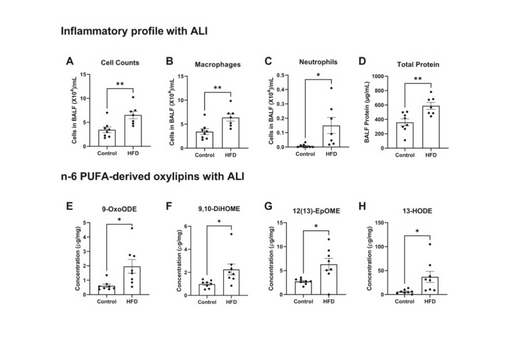Obesity reprograms the pulmonary polyunsaturated fatty acid-derived lipidome, transcriptome, and gene-oxylipin networks
Abstract
Obesity exacerbates inflammation upon lung injury; however, the mechanisms by which obesity primes pulmonary dysregulation prior to external injury are not well studied. Herein, we tested the hypothesis that obesity dysregulates pulmonary PUFA metabolism that is central to inflammation initiation and resolution. We first show that a high-fat diet (HFD) administered to C57BL/6J mice increased the relative abundance of pulmonary PUFA-containing triglycerides and the concentration of PUFA-derived oxylipins (particularly prostaglandins and hydroxyeicosatetraenoic acids), independent of an increase in total pulmonary PUFAs, prior to onset of pulmonary inflammation. Experiments with a genetic model of obesity (ob/ob) generally recapitulated the effects of the HFD on the pulmonary oxylipin signature. Subsequent pulmonary next-generation RNA sequencing identified complex and unique transcriptional regulation with the HFD. We found the HFD increased pathways related to glycerophospholipid metabolism and immunity, including a unique elevation in B cell differentiation and signaling. Furthermore, we conducted computational integration of lipidomic with transcriptomic data. These analyses identified novel HFD-driven networks between glycerophospholipid metabolism and B cell receptor signaling with specific PUFA-derived pulmonary oxylipins. Finally, we confirmed the hypothesis by demonstrating that the concentration of pulmonary oxylipins, in addition to inflammatory markers, were generally increased in mice consuming a HFD upon ozone-induced acute lung injury. Collectively, these data show that a HFD dysregulates pulmonary PUFA metabolism prior to external lung injury, which may be a mechanism by which obesity primes the lungs to respond poorly to infectious and/or inflammatory challenges.
Keywords: arachidonic acid; glycerophospholipid metabolism; high-fat diet; inflammation; nutrition; omega-3 fatty acids; oxylipins; prostaglandins; transcriptional regulation; triglycerides.Citation
Virk, R., Buddenbaum, N., Al-Shaer, A., Armstrong, M., Manke, J., Reisdorph, N., Sergin, S., Fenton, J. I., Wallace, E. D., Ehrmann, B. M., Lovins, H. B., Gowdy, K. M., Smith, M. R., Smith, G. J., Kelada, S. N. P., & Shaikh, S. R. (2022). Obesity reprograms the pulmonary polyunsaturated fatty acid-derived lipidome, transcriptome, and gene-oxylipin networks. Journal of Lipid Research, 63(10), 100267. https://doi.org/10.1016/j.jlr.2022.100267


